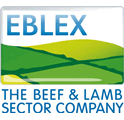| 2009-06-05
Pedigree sheep producers James and Barbara Stratton, who farm at Charlton Mackerell in Somerset, have won the EBLEX Most Progressive Flock Award for the Dorset breed. The results are based on Signet records for 2008.
James Stratton keeps his ram team young for faster genetic gain.
 |
Organised through the Sheep Better Returns Programme, this is presented to the performance recorded flock that has shown the most impressive improvement in genetic merit, over a twelve month period, within the breed.
The Stratton’s established the Stratasys flock when they purchased their farm ten years ago starting with 30 Dorset ewes, and then building up to 200. More recently numbers have been reduced to 100 ewes.
Mr Stratton is very interested in genetics and has recorded the performance of the flock since the start. He carefully selects individual sires for every single ewe to ensure an appropriate match, based on the animals’ overall index and Estimated Breeding Values (EBVs) for traits such as growth rate and eye muscle depth.
The ewes are mated during April and May and stay out at grass with no extra feed until lambing in September. They are brought inside to lamb as it is easier to record lambings and mark any ewes that have been assisted for culling. The ewes and lambs are out on grass until December, when the lambs are brought in for their eight-week weighing, and are then turned back out onto turnips.
Weaned at 12 weeks, they stay on the forage crop until the 21-week weigh and back-fat scan. Any males or females not achieving target figures are sold through the local auction market.
“I set a target index that the ewes should achieve each year,” Mr Stratton explains. “Last year it was over 200; each year I try to improve this by 50 points. The first ram I bought was unrecorded and turned out to have an index of 15. My rams now all have indexes over 300.”
The Strattons sells breeding stock mainly to other pedigree breeders rather than commercial producers.
When choosing rams for their own flock they rely heavily on information about their past performance. They are also embracing new technology such as marker assisted selection, which identifies specific genes which have been used as part of the national scrapie plan, and to introduce the desirable Loinmax gene which increases meat yield in the loin area.
They recently introduced a New Zealand bloodline with the loinmax gene. The Stratasys sire team is also kept young – just ram lambs or shearlings are used, to make the fastest genetic progress possible.
Commenting on winning the award, Mr Stratton commented that it was good to know that his focus on performance figures and careful planning of each mating is paying off. “It’s encouraging to know that we are on the right track,” he said.
Information holds the key to progress
“Selecting rams with known, superior EBVs for key traits and a high overall terminal sire index, allows pedigree producers to advance their genetic base over a relatively short period of time,” says EBLEX sheep breeding specialist Samuel Boon.
“I congratulate James for the immensely detailed and valuable work he is doing with this breed. By focussing on, and recording production traits that really matter, he is not only improving his own flock, but also making it easier for other pedigree Dorset breeders to find rams they know will have a positive impact on their breeding enterprise.”
 EBLEX Most Progressive Flock Award for the Meatlinc Breed EBLEX Most Progressive Flock Award for the Meatlinc Breed
 Winholme Bleu du Maine Flock is Most Progressive Winholme Bleu du Maine Flock is Most Progressive
 Millfields Hampshire Down Flock Awarded Championship Millfields Hampshire Down Flock Awarded Championship
|



